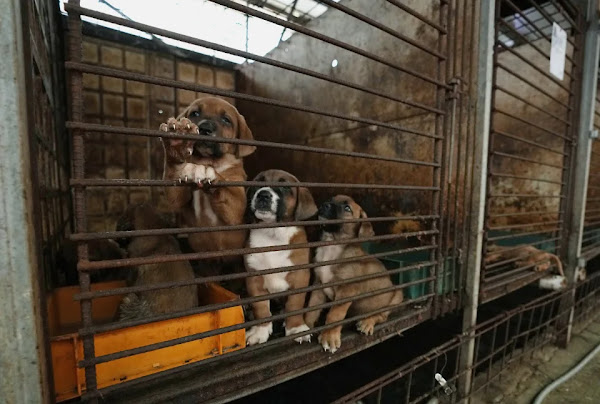In Pyeongtaek, South Korea, a dog farm recently captured attention as dogs were seen confined in cages, sparking renewed discussions surrounding the controversial practice of dog meat consumption in the country. The centuries-old tradition of consuming dog meat on the Korean Peninsula remains a divisive issue, with advocates of the practice highlighting cultural significance, while opponents argue for its prohibition due to animal rights concerns and potential impact on the country's international reputation.
As of now, dog meat consumption is neither explicitly prohibited nor legalized in South Korea, leading to a gray area in its regulation. However, a growing number of South Koreans are joining the movement to ban the practice altogether, citing increasing public awareness of animal rights and concerns about the country's global image.
The dog farm in Pyeongtaek is just one of many establishments that raise dogs for the purpose of meat consumption. Critics argue that the conditions in which these animals are kept can be inhumane and raise ethical questions about the treatment of animals raised for food. The images of dogs confined to cages have sparked outrage among animal rights activists, both within South Korea and on an international level.
Supporters of banning dog meat consumption in South Korea argue that as a society progresses, there is a need to reevaluate cultural practices that might be seen as outdated or inhumane. They highlight the increasing empathy and compassion towards animals and the growing understanding of their sentience. Moreover, they believe that ending the practice of dog meat consumption would align the country with global animal welfare standards.
Additionally, the issue has significant implications for South Korea's international standing. The practice of consuming dog meat has drawn criticism and negative attention from various countries and international organizations, who view it as inhumane and a violation of animal rights. As South Korea continues to engage in global affairs and hosts international events, there is a growing concern that the association with dog meat consumption could tarnish the country's reputation.
However, advocates of preserving the tradition argue that dog meat consumption is deeply rooted in Korean culture and history. They assert that it is essential to respect cultural diversity and refrain from imposing external values on traditional practices. They also contend that the farms where dogs are raised for meat are regulated, and improvements have been made to address animal welfare concerns.
To address the issue, the South Korean government faces the difficult task of finding a balanced approach that respects both cultural traditions and animal welfare. Some regions within the country have already taken steps to ban the practice, reflecting the growing national debate on the matter.
As the calls for a nationwide ban on dog meat consumption intensify, the issue is likely to remain at the forefront of South Korea's social and political discourse. The country's ability to navigate this sensitive topic with sensitivity to both cultural heritage and ethical considerations will be pivotal in shaping its national identity and international standing in the years to come.



No comments:
Post a Comment